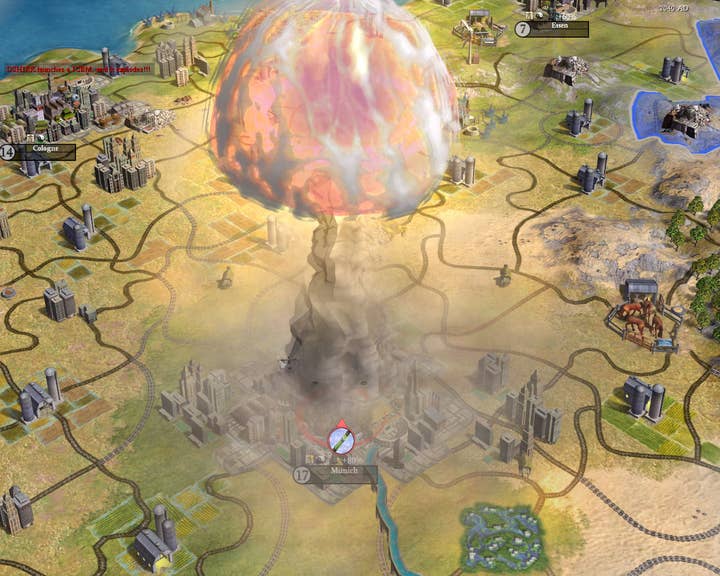A Civilized Man: Soren Johnson's Life After Zynga
"No one really seems to like free-to-play, it's weird that it kind of feels like we're saddled with it."
"Mars is a game that would not have been an easy sell for other publishers," admits its creator Soren Johnson.
"When you try to pitch a project that's going to be costing multi-millions of dollars and is going to be one of their key products for year X or whatever they don't want to hear it's a type of game that has never really been tried before."
When it comes to the industry, you might say that Soren Johnson is a man of extremes. He made his name on the uber hardcore strategy titles like Civilization IV back in 2005, but in 2011 he joined Brian Reynolds' Zynga East studio, a company known for an approach to gaming so casual it wears slippers and a onesie out to dinner.
Now he's back with his own studio, Mohawk Games, and this time he fully intends to do things his way. No free-to-play, no marketing executives to please, just a serious team of developers and a new economic strategy title codenamed Mars.
"Inside Zynga is the exact same questions that were being asked externally were absolutely being asked, even more stridently, internally"
"An economic game is not an easy sell from a marketing point of view. You make a game about modern conflict - tanks and planes and battleships or even Starcraft - it's very easy to imagine what you put on the cover of the box. You make a game about a business, how do you sell that exactly? That's a challenge right there."
There's one thing Johnson and the team is very sure of, and that's that the game will not be free-to-play. It'll be a traditional, pay once, play forever deal for consumers. It's fair to say that 18 months with Zynga weren't enough to convert Johnson to the delights of micro-transactions.
"Zynga has taken a lot of criticism within the game development community for the types of games it makes and how it treats its customers and so on and so forth and the classic dilemma of the business side versus the game design side," he explains. "One thing I found very interesting inside Zynga is that the exact same questions that were being asked externally were absolutely being asked internally and perhaps even more stridently internally. There was a lot of open debate and arguments about these types of issues. The company itself was often uncertain about in what direction it should go."
This was before the IPO, when Zynga was still riding high on its successes and looking to branch out to other game genres. Johnson was part of that plan, joining Zynga East in Baltimore to make a strategy title, one that would be aborted when Zynga East was shut in February.
"It was a lot of fun, we played internally a lot, but once Zynga started having trouble some of the more speculative projects became not as important."
"Part of the reason it didn't get me down too much was I was fairly certain I would be able to start up a studio of my own and whatever I worked on next I could make sure that it was going to come out, and come out in a way that I was happy with."

He clearly still finds free-to-play fascinating as a disruptive element in the industry, but in the same way you might find a super poisonous spider fascinating. He's curious, interested, but he doesn't necessarily want it on his desk.
"It's kind of a bizarre thing where, certainly for people who are in the industry and for core gamers, no one really seems to like free-to-play. It's not something people get excited about so it's weird that it kind of feels like we're saddled with it. "
He points out that there are billions of people in the world, and for a large chunk of them the idea of a game being (or at least appearing) to be free is always going to powerful. But it's not just those people that companies like Zynga are targeting, he suggests, it's those mythical whales that are buying the $100 power ups every week. He says its that one per cent of gamers that are really messing with the games' designs.
"The fact that there are people willing to do that, that's what powering these companies like Supercell that have gone from nothing to a multi-billion dollar valuation in a few years based off just a couple of games," he explains.
"These people that are putting in thousands of dollars every month. And the fact that these people exist means that at least for the foreseeable future all of the big publicly traded companies are going to start chasing these people because that's where the big profits margins are. So even if the majority of the core audience doesn't want these free-to-play games the money from the whales is basically going to outvote them."
Luckily, it's not something Johnson has to worry about in the immediate future because Mohawk Games has its own whale, in the form of the Stardock Strategic Investment Fund. Stardock is also helping out with some of the more boring aspects of the running a studio, finance and legal and HR and press and marketing and so on.
"It's hard to see something that you know could work really well and you're passionate about trying out," he says.
"Even if the majority of the core audience doesn't want these free-to-play games the money from whales is basically going to outvote them"
"I don't want to try to twist people's arms to make them help me create this game. I want them to be as excited about this game as I am. So it was really great to find Brad [Wardell] who was able to see the same thing that I was."
In fact Wardell thought the idea for Mars sounded awesome, and is now the company president, joining Johnson and Dorian Newcomb on Mohawk's management team. The company started in April, and after trying a few different ideas out, Mars was born in June or July. Those interested can expect to find the company very open about the process.
"It it isn't about the single release date anymore, there's this long multi-step process that you go through that I think is very healthy."
Wanting to make the most of that process means Mohawk Games could well use Kickstarter in the future. While they have the financial backing to begin development of Mars, Johnson is keen to apply its collaborative feel to Mohawk's development process.
"The last thing you want when you're developing a game is to lock yourself away in a room for three years and at the end of it hope that you come out with something that's good. As much as possible you want to get real, honest feedback on the progress you're making."
So right now the team are focused on getting the game into a playable state, recruiting a few new team members and looking forward to the future. As for when the game might be finished? Johnson is enjoying not having to make that decision just yet.
"The game determines our progress, not the other way around."

